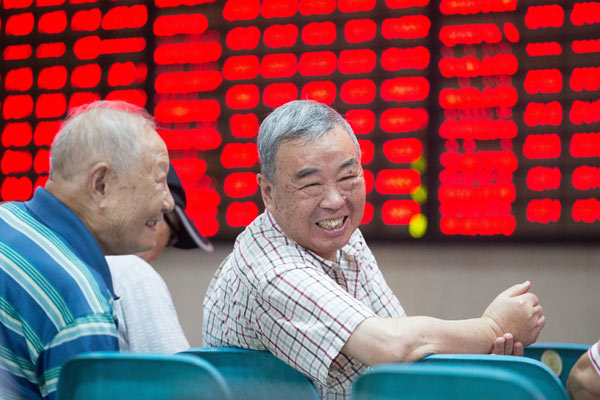Equities set for Jul-Dec bounce
 |
|
Investors check out stock quotes at a brokerage in Nanjing, Jiangsu province. [Photo by Su Yang/For China Daily] |
China's equity market is expected to improve in the second half of this year as investor sentiment is brightening in a largely stable macroeconomic environment, said analysts.
Growth momentum remains robust as shown by the first-quarter GDP growth of 6.9 percent year-on-year, the strongest quarterly real growth since the third quarter of 2015.
The benchmark Shanghai Composite Index began the year at 3,158 points and ended at 3,192 on June 30, the last trading day in the year's first half.
Analysts said the SCI is likely to end the year around 3,400, implying a 7.6 percent rise for this year.
Similarly, sectoral indexes such as those for public utilities, infrastructure, consumption and healthcare are expected to gain in the range of 5 to 12 percent this year.
Even other key equity markets such as Shenzen and Hong Kong are expected to rise in the range of 3 to 7 percent this year.
Such a rise is expected as the fundamentals of China's economy are positive for long-term growth, which supports investor sentiment in the market, analysts said.
Also, the inclusion of Chinese A shares in the MSCI Emerging Markets Index marks another milestone in the internationalization of Chinese equities, they said.
Ma Lei, Chinese equities portfolio manager at Fidelity International, said the country's capital market will become more attractive for global asset managers and there will be more investments in China's onshore market.
In the long term, innovation will drive growth in all sectors, including fast-moving consumer goods and textiles, as against the current view that it is related only to high-tech, industrial and scientific research, he said.
FMCG and textiles have so far relied heavily on marketing and branding, he said. "Today, if a clothing company invents a high-performance fabric, such a breakthrough would likely be the result of innovation. Such a company's valuation will grow fast. Bright prospects await companies with outstanding innovative capabilities and products across consumer-related sectors, services and industrial segments, which will drive growth over the next decade," said Ma.
Zhou Hao, senior economist of emerging markets with German lender Commerzbank, said that China is likely to see another property slowdown amid a cooling of the property market in the big cities and rental yields dropping to a low level.
China's headline growth has stabilized due to housing investment picking up over the past few quarters. However, the leading housing investment, and housing prices, indicate that the property sector is likely to experience a deceleration in the second half of this year.
"It's expected that capital may flow from the property market to the equity market," said Wang Hanfeng, an analyst with CICC, in a research note.
China's GDP growth is likely to moderate somewhat in the coming quarters due to the property slowdown, but growth is still expected to be 6.5 percent or above, said Zhou.
"For the remainder of this year, we would expect to see two large policy changes in China: a focus on the real economy and further mergers in State-owned enterprises," said Zhou.
Deleveraging is also a factor that needs to be taken into consideration, other analysts said.
"This year is to China's shadow banking regulation what 2014 was to China's local government financing vehicles regulation. We anticipate a moderate decline in the prevailing yields and reassured funding for infrastructure projects in the near term. We raised exposure to banks and infrastructure proxies, and cut cash levels from 3 percent to zero," said Wendy Liu, chief China strategist at Nomura Securities.
Upgrading of manufacturing and consumption will have an obvious impact on the equity market, with enterprises' profitability expected to rise soon, thanks to rising incomes of people, drop in commodity prices and tax cuts, said Wang of CICC.
















